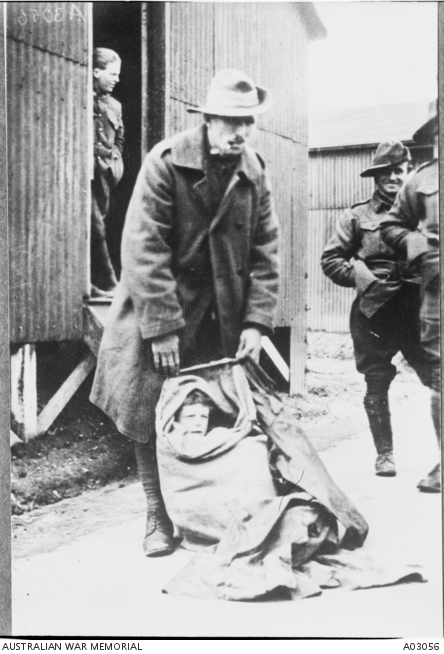The Little Digger – a story from the State Archives blog
This is an amazing and touching story of a little French boy who was adopted by Australian soldiers and brought to Australia…and attended Kangaroo Point School for a while.
As the members of the No 4 Squadron, Australian Flying Corps, sat down to enjoy their Christmas dinner in Bickendorf in 1918, they realised they had an extra and unexpected guest at the table. Little Henri, barely more than 9 years old, had wandered in from the cold by following the smell of the roasting poultry, and soon found himself the guest of honour. With the permission of the squadron leader, Air Mechanic Timothy William Tovell and his brother Edward took charge of the little orphan boy. They soon determined that Henri had tragically lost both his parents in the earliest days of the war, and had since attached himself to several British units serving in the area, suffering injuries twice when those units he was with fell to invading forces.
 Air Mechanic Tovell, previously of Toowoomba, Queensland, was determined that Henri would become one of his own family. He promptly wrote to his wife Gertrude home in Australia declaring his intent to adopt the boy, without knowing that his own son, Timmy, had passed away at the same time as the letters’ arrival. With the war at an end, the 4thSquadron received orders to return to Australia. Tovell was determined that Henri, known fondly by the soldiers by now as the ‘Little Digger’, should travel with them.
Air Mechanic Tovell, previously of Toowoomba, Queensland, was determined that Henri would become one of his own family. He promptly wrote to his wife Gertrude home in Australia declaring his intent to adopt the boy, without knowing that his own son, Timmy, had passed away at the same time as the letters’ arrival. With the war at an end, the 4thSquadron received orders to return to Australia. Tovell was determined that Henri, known fondly by the soldiers by now as the ‘Little Digger’, should travel with them.
In order to reach England, Tovell secreted Henri away in an oats sack, carrying him for hours on his back as they made their way past the French authorities and on to Southampton. The challenge now was to get him aboard the troop ship bound for Australia without getting caught.
In this extract from the Northern Herald (1919) Tovell describes the method used to smuggle Henri onto the waiting ship:
All went well till the day came for us to embark for Australia. We had no excuse for having an oat bag on the ship – the Kaiser-I-Hind – and for a time we were on queer street. There were all sorts of bets made among the men as to whether we would land him on the transport, and those who bet the squadron could do it won their wagers. We got a large basket and branded it ‘Sporting Materials.’ We fitted him into the basket and got him aboard. At the top of the gangway the embarkation officer asked, ‘What’s in that basket?’ An Australian officer replied, ‘Only boxing gloves.’ The basket was passed by the embarkation officer and stowed below. Three days after the ship sailed the lad was produced, to the amazement of the majority of the troops. The Northern Herald, 6 August 1919.
While the captain of the ship seemed to turn a blind eye to his little stowaway, further issues with immigration controls as they headed towards Australia were addressed by none other than the Premier of Queensland, Thomas Joseph Ryan, who was returning from a trip to England with his family aboard the same ship. Premier Ryan made contact with authorities in Australia to grant permission for Henri to land in Australia with the troops.
By the time the Kaiser-I-Hind had reached Brisbane Henri’s story was already known to the public, and a crowd awaited his arrival. There were many who were interested in the young orphan boy, including the French Consul and the Governor General Sir Hamilton Goold-Adams. One woman even offered Timothy Tovell a significant amount of money to allow her to take charge of Henri. Tovell refused, and with the permission of the local authorities took Henri into his home and family, supporting him entirely out of his own means, besides a sum that had been collected while still on board the ship. Henri continued to live with his new family in Queensland for the next four years, attending school at Kangaroo Point.
When he reached the age of 16, Henri took work in Melbourne as a Junior Assistant in the Office of the Secretary at Victoria Barracks. Henri’s dream was to join the Australian Air Force like his foster father, but was unable to get around the issue of his French citizenship without proper evidence of his birthdate. He was finally able to get work as an apprentice mechanic with the Australian Air Force, and in 1928 was awaiting the acceptance of his naturalisation papers, which would have allowed him to become a permanent member of the Australian Air Force, when he again met with tragedy. While travelling home one night on his motorbike, Henri was in an accident and suffered serious internal injuries. In the early hours of the 24th May 1928, believed to be only 21 years of age, he succumbed to his injuries and passed away. He received an air force burial, and funds were raised for a memorial to be placed on his grave in Melbourne.
References:
National Archives of Australia (1923-1933). Henri H Tovell – Memorial. Retrieved from https://recordsearch.naa.gov.au/SearchNRetrieve/Interface/DetailsReports/ItemDetail.aspx?Barcode=651151&isAv=N
“French Orphan”. (1919, 6 August) The Northern Herald. Retrieved from https://trove.nla.gov.au/newspaper/?q
“In Basket”. (1928, 25 May). The Sun. Retrieved from https://trove.nla.gov.au/newspaper/?q
“Fatal City Accident”. (1928, 25 May). The Age. Retrieved from https://trove.nla.gov.au/newspaper/?q
Cover image: Queensland State Archives, Digital Image ID 26082


